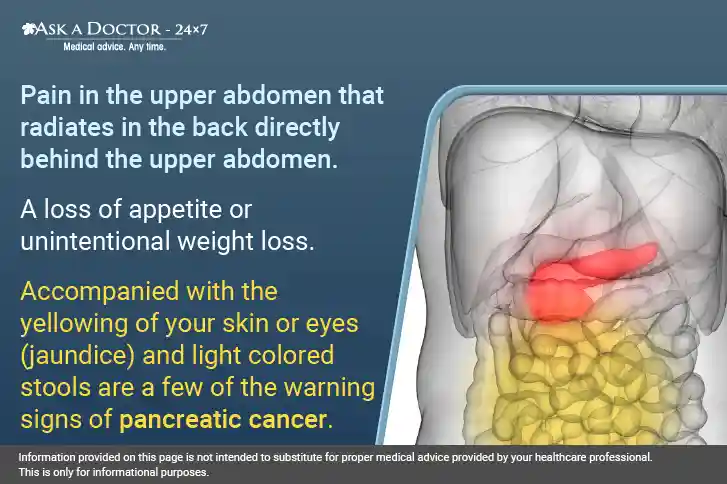Know All About Pancreatic Cancer
Pancreatic cancer occurs within the tissues of the pancreas. To know all about pancreatic cancer, let us understand the anatomy of the organ, pancreas. It is 6” to 10” elongated glandular organ located in your upper left abdomen, right behind your stomach. The pancreas generates two crucial hormones called glucagon and insulin that aid in the metabolism of glucose (sugar). When glucose levels are too low, glucagon helps raise blood sugar levels, while insulin helps in the metabolism of glucose to produce energy. Also, the pancreas assists in digestion by producing enzymes to digest carbohydrates, proteins, and fats.
Unfortunately, the cancer in pancreas is difficult to detect in the early stages and this is why the survival rate of pancreatic cancer is very low. Read on to know every thing related to pancreatic cancer in detail...
Risk Factors of Pancreatic Cancer
Risk factors can be identified in only 40% of cases. Still, there is NO disease without a RISK:
- Smoking (cause of 20-35% of pancreatic cancers)
- Alcohol consumption (heavy)
- Family history (cause of 10% of pancreatic cancers)
- Long-standing diabetes
- Obesity
- Chronic pancreatitis (inflammation of the pancreas)
- Cirrhosis of the liver
- Occupational hazards due to exposure to chemicals in the dry cleaning and metalworking industry
Stages of Pancreatic Cancer
In the context of cancer therapy, ‘Stage’ is a term to describe the extent of the disease spread. Depending on the pancreatic cancer stage, patients are categorized for treatment and for clinical trial classification. The stages are as follows:
Stage 0: No spread. Pancreatic cancer is confined to the top layers of the ducts of the pancreas. Imaging techniques and even the human eye cannot detect pancreatic cancer.
Stage I: Local growth. Pancreatic cancer is confined to the pancreas, but is no bigger than 2 cm (0.8 inch) across (stage IA) or greater than 2 but no more than 4 cm across (stage IB).
Stage II: Local spread. Pancreatic cancer is over 4 cm and is either limited to the pancreas or there is local spread where the cancer has grown outside of the pancreas, or has spread to nearby lymph nodes. It has not spread to distant sites.
Stage III: Wider spread. The tumor may have expanded (bigger than 4 cm) into nearby major blood vessels or nerves and has spread to four or more nearby lymph nodes. It has not spread to distant sites.
Stage IV: Confirmed spread. Pancreatic cancer has spread to distant organs.
Warning signs of Pancreatic Cancer

Unfortunately, early pancreatic cancer doesn't cause any warning symptoms. Symptoms often appear only when the tumour begins to affect other digestive system organs.
Some common signs of pancreatic cancer include:
- Jaundice (yellowing of the skin) or related symptoms like dark urine, itchy skin, and pale-light colored stool (fatty stool)
- Upper abdominal pain/back pain
- Lack of appetite and weight loss
- Nausea and vomiting
- Swelling of the gallbladder or liver enlargement
- Blood clots (deep vein thrombosis)
- New-onset diabetes due to destruction of insulin-making cells
Management and Treatment of Pancreatic Cancer

Even though pancreatic cancer has a low survival rate, early identification and treatment can result in a full remission. The only effective treatment for pancreatic cancer is complete or partial surgical excision of the pancreas depending on the location, size, and stage of cancer; patient’s age; general health; and their personal preferences. Only 20% of people who get early diagnosed with pancreatic cancer are able to have surgery, as for others, disease has already spread.
The question arises: Can you live after the removal of your pancreas? The answer is yes! But you will be diabetic. People who get their pancreas removed have to take insulin regularly to treat their diabetes. Also, one requires enzyme pills to help in the digestion of food.
Other treatment management options include:
- Chemotherapy: A drug treatment that kills cancer cells and prevents them from spreading.
- Targeted therapy: A drug treatment that has specific targets on the cancer cells, so their whole body impact is less.
- Radiation therapy: It involves focusing high-energy rays on the cancer cells.
- Palliative therapy: Relieving pain and other side effects, controlling diabetes, improving digestion and appetite
When To See a Doctor?
You should consult a doctor in the following scenario:
- Indigestion, loss of appetite, and weight loss
- Severe excruciating pain in the upper abdomen/back
- Foul-smelling greasy stool
- Recent-onset diabetes in elderly patients
- Unexplained jaundice with no initial symptoms, though later exhibiting yellowish discoloration of eyes and skin and itching all over the body.
How to Reduce the Risk of Pancreatic Cancer
Unfortunately, most cases of pancreatic cancer cannot be prevented, but by keeping a healthy weight, quitting smoking, and drinking in moderation can lower your risk. Chronic pancreatitis and family history are additional risk factors. By maintaining lifestyle changes like exercising, avoiding consumption of preservatives, avoiding red meat or processed meat, eating more fruits and vegetables also play role in reducing the incidence of pancreatic cancer.
Also, early detection of the cancer is a key, so go for routine pancreatic cancer screenings involving imaging tests, endoscopic ultrasounds, and serum markers.
Hence, pancreatic cancer is a rare but fatal disease, with few established risk factors, including smoking, heavy alcohol consumption, genetic predisposition, long standing pancreatitis, and advancing age. A pancreatic cancer diagnosis can be a life-changing experience. Your healthcare provider, with a team of experts would help you to assist in these trying times. The main treatment involves partial or complete removal of the pancreatic gland.
If you have any questions about pancreatic cancer or notice any new symptoms of jaundice, diabetes, or sudden weight loss, you can check with our team of specialists at Ask a doctor, 24x7.
Recently Answered Questions Related to Pancreatic Health Concerns
- Does My Lab Test Report Indicate Pancreatic Parenchymal Abnormalities?
- Suggest Treatment For Pancreatic Mucinous Neoplasm
- Are Abdominal Pain, Nausea And Bloating Symptoms Of Pancreatic Cancer?
- What Does My MRI Scan Report Indicate About Pancreas?
- Suggest Treatment For Dilation Of Common Bile Duct
- Suggest Treatment For Pancreatitis
- Diagnosed With Chronic Pancreatis
- How To Cure Pancreatic Parenchymal Abnormalities?
- Is Pancreatic Cancer Hereditary?
- Is Flank Pain A Symptom Of Pancreatitis?
- What Treatment Is Suggested For Pancreatitis?
Disclaimer: Information provided on this page is not intended to substitute for proper medical advice provided by your healthcare professional. This is only for informational purposes.
Ask a Specialist
Recent Questions


